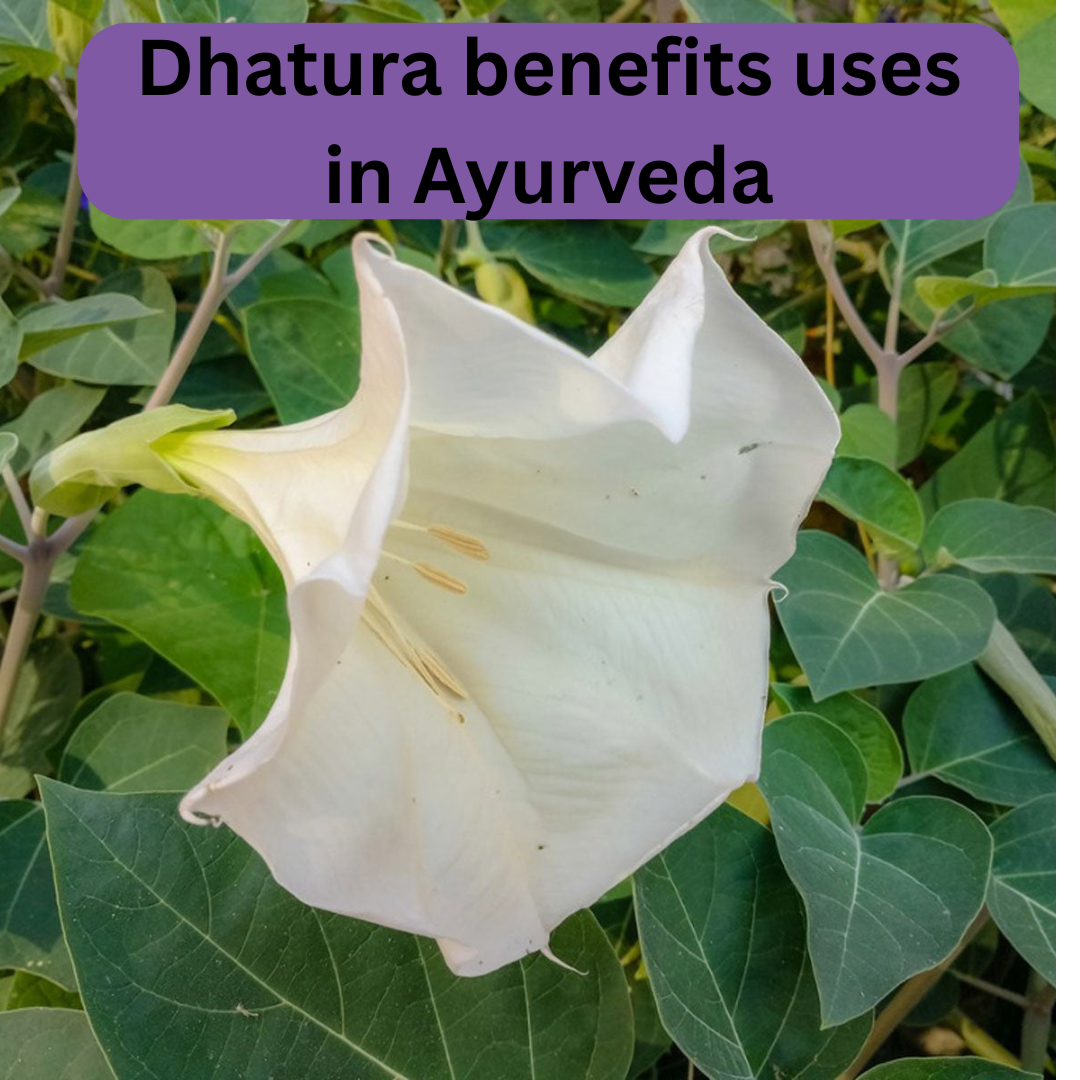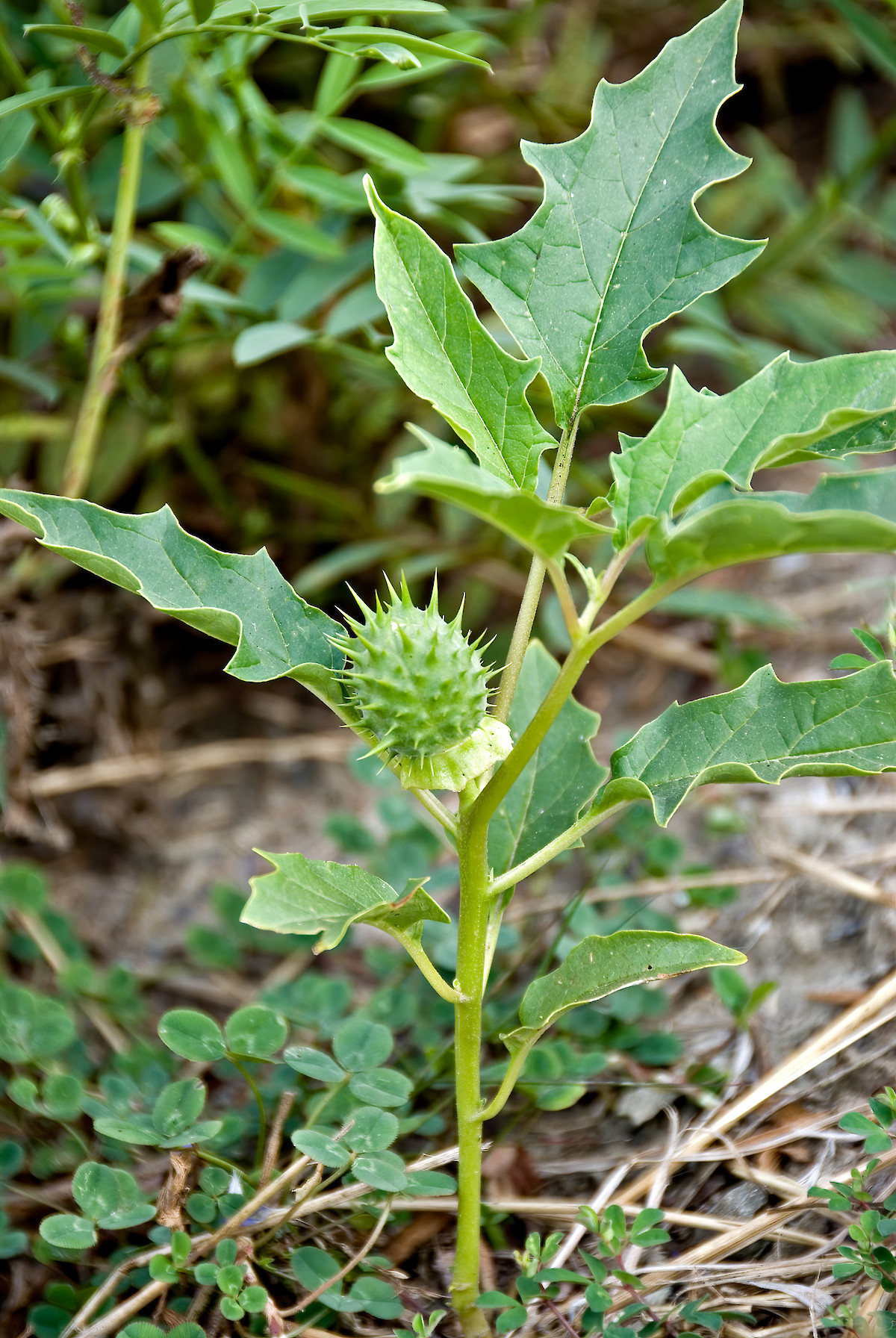Dhatura benefits uses and home remedies

What is dhatura?
Nature is full of dualities. Some plants heal, some harm — and some, like Dhatura, do both. With its mysterious aura, trumpet-like flowers, and presence in sacred rituals, Dhatura (also known as Datura or Thorn Apple) has been both revered and feared across cultures for centuries.
Let’s explore how this potent plant has walked the tightrope between medicine and poison — and why deep respect and expert knowledge are crucial when dealing with it.
Latin Name: Dhatura metal linn.
Vernacular Names:
- Hindi: Sada dhatura
- Bengali: Dhatura
- Tamil: Ummattangani/Vella-ummathai
- Telugu: Ummetta
- Kannada: Datura/ Unmatta
- Malayalam: Unmatta/Datura
- Marathi: Dhatura
- Gujarati: Dhatura
- English : Thorn Apple, Devil trumpet
Sanskrit Names:
Dhattura, Kanaka, Kanakahvya – beacuse of golden yellow colored seeds
Dhurta, Umatta, Matula- because it is having hallucinating effect
Shivapriya – lord shiva likes dhatura, it is used in worshiping lord shiva
Mahamohi- it is highly narcotic
Kantaphala : Fruits are covered with spines
Ghantapushpa: flowers are funnel shaped.
Benefits & Ayurvedic Properties of Dhatura
Ras
- Tikta (Bitter)
- Katu ( Pungent)
Veerya ( Potency)
- Ushna (Hot)
Vipaak ( Post-digestive effect)
- Katu (Pungent)
Guna ( Qualities)
- Laghu (Lightness)
- Rooksha (Dry)
Dosha Effect
Balances: Vata and Kapha dosha
May increase: Pitta (if overused)
Chemical constituents
Imbibed with powerful hallucinogenic and deliriant properties, Datura has a mother lode of antioxidants, flavonoids, alkaloids, organic compounds, and minerals. The bioactive components in Datura include Daturine, Daturadiol, Hyoscine, Atropine, Noratropine, Fastudine, Allantoin, Hypocyamine, Norhyosciamine, Tropane, Meteolodine, Scopolamine, Mucilage, Albumen, Vitamin C, Niacin, and Malic Acids.

Health Benefits of Dhatura( To be used under supervision of doctor only)
Pain Relief
The alkaloids in Dhatura — atropine, hyoscyamine, and scopolamine — act on the nervous system, helping reduce severe pain and muscle spasms.
Respiratory problems
Having powerful anti-inflammatory, expectorant, and anti-spasmodic properties, the entire plant hold high significance in treating all sorts of respiratory troubles including the common cold, flu, whooping cough, asthma, bronchitis, etc. Being a natural expectorant, it helps in getting rid of the mucous deposits within the chest and nasal cavities and thus helps in breathing.
Helpful for digestive system
It prevents constriction of muscles of the digestive tract, reduces the production of gastric juice hence helps to reduce abdominal colic pain and also beneficial in gastric and deodinal ulcer gall bladder stone and others.
Useful in Skin problems
Dhatura is said to kusthhar and kanduhar and also posses antimicrobial property. Because of this it is very effective in managing skin problems especially the one having vata-kapha imbalance. This includes problems like
- Eczema
- Acne
- Psoriasis
- Non healing wound
Actions (Karma) of Dhatura in Ayurveda
Kantukari – On external application, it improves skin quality
Vranut – Helps in faster wound healing( external application)
Artinut – Helps to relieve pain and inflammation(external application)
Kushtani hanti – used for external application in skin diseases
Jvara– Its application helps to relieve fever
Kanduhar – relieves itching when used for external application.
How to use Datura
Dhatura can be consumed only after it is properly purified. Never use unpurified dhatura. It can be consumed in various forms, including:
- Seed: 50 to 100 mg
- Root powder: 62.5 mg- 250mg
- Part Used : Seeds, flowers, root bark, leaves
What are toxicity symptoms of dhatura
Tropane alkaloids present in all parts of dhatura has toxic effect.
If it is used even in small quantity without purification then dhatura may cause following symptoms
- Hallucination
- Headache
- Convulsions
- Dry mouth and difficulty swallowing
- High fever and flushed skin
- Dilated pupils and blurred vision
- Rapid heartbeat
- Loss of coordination
- Seizures or unconsciousness (in severe cases)
Toxicity treatment
Stomach wash is done with pottassium permanganate solution (1:1000) and 5% tannic acid solution.
The others treatments are done as per requirement.
How is Dhatura purification ( Shodhana) done ?
Dhatura seeds are taken in a clean cloth. It is tied to make a bolus. The cow’s milk is taken in vessel a horizontal rod is kept on the vessel. Now the bolus is tied to the rod in such a way that seeds are dipped in milk kept in the vessel. The seeds are then boiled in cow’s milk for 3 hours. This whole process in known as swedana.
The seeds are then washed in hot water ,dried and are preserved.
What are the side effects of Dhatura
Like any other Ayurvedic herb devdaru is having many health benefits . However , it may have some side effects as well They include
Allergic Rashes
If someone is sensitive to devdaru they may see skin rashes or redness and ithcing. In this condition it is advisable to discontinue the use .
Precautions
During breast feeding avoid consuming Dhatura
Avoid consuming Dhatura during pregnancy due to lack of research on safety during pregnancy.
It should not be used in childrens.
Always use Dhatura in recommended dosage to avoid potential side effects such as nausea and bloating. It is better to ask Ayurveda doctor about dose and suitability for your body type.
If you have pre existing medical conditions or taking any medications, consult a doctor before using dhatura. This ensures that there are no harmful interactions or contraindications.
Don’t use dhatura continuosly for long period of time . Take break to allow your body to respond appropriately. Also when we use any herb continuosly ,then the body becomes use to it and it don’t respond to it.
Store dhatura in cool and dark place to maintain its potency and prevent it from contamination. Proper storage helps in retaining its therapeutic value.
Frequently asked question
1.Can this herb be used while taking homeopathic medicine ?
Yes. This herb does not react with homeopathic medicine.
2.Can this herb/medicine be continued while taking supplements like multivitamin, omega 3, spirulina ?
Yes .Generally this herb goes well with most dietary supplement. However if you are taking more than one product per day please consult your doctor for opinion.
3. With western/modern medicine
Seek your doctors advice if you are taking this product along with other western (allopathic/modern) medicine. Some ayurvedic herbs can interact with modern medicine.
When taking ayurvedic medicine or herb with modern medicine it is best to keep one hour gap in between both the medicine.
4. How long does dhatura take to start showing benefits ?
It depend on any existing disease, overall health, your prakriti ( genetic make up) all these factors plays a role in how quickly dhatura powder benefits are seen.
5.Can it be used in people with diabetes?
Yes. But always keep watch on your sugar levels. This herb can lower your blood sugar levels. Do not stop your diabetes medicine once you start taking this herb/medicine. Keep in touch with your ayurvedic doctor. They will guide you in this respect.
6.Are there any diet restriction( Pathya) while taking this seeds ?
No .There are no such restriction while taking this product. However if you have been advised with any specific diet based on disease, you should continue to follow it.
Ayurvedic medicine that contains dhatura
Dhatura is one the ingredients in following medicines
Mahavishgarbha tail: This ayurvedic oil is used for pain relief in low back pain, sciatica, stiffness and others.
Kanakasav: This asav is used in treatment of cold, cough, bronchitis and asthma.
Dhurdhurapatradi tailam : This oil is used in treating dandruff and hair fall.
Conclusion
Dhatura stands as a powerful reminder of nature’s complexity. In the hands of experienced healers, it becomes a remedy; in untrained hands, a dangerous poison.
So next time you see this hauntingly beautiful plant blooming by the roadside or near a temple, remember: it’s not just a flower — it’s a teacher of wisdom, caution, and deep respect.
🌱 “Nature gives freely, but it asks us to be wise.”
Please consult your doctor before taking this medicine.
This Article is written by Dr. Ashutosh Tiwari B.A.M.S, PGDCR Director of Risha’s Health And Ayurvedaa Solutions.He is having more than 20 years of experience in field of Ayurvedic medicine.
.
Disclaimer :The content provided here is for informational purpose only. This blog is not intended to substitute for medical advice, diagnosis or treatment. Always seek medical advice of a qualified healthcare provider for any questions or concern you may have regarding a medical conditions.
.
